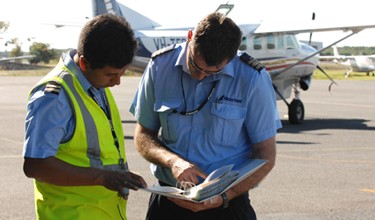Flight operation regulations have changed
The flight operations rules changed on 2 December 2021. See all information about transitioning.
Read more
The flight operations rules changed on 2 December 2021. See all information about transitioning.
Read more
New basic operating rules for all pilots commenced on 2 December 2021.
Part 91 of the Civil Aviation Safety Regulations (CASR) – General operating and flight rules, sets out the general operating rules for all pilots and operators. It consolidates all of the general operating and flight rules for Australian aircraft.
The rules cover:
We have compiled information and resources about transitioning to the new regulations. Visit our Flight operations transition section to find out more.
Part 91 applies to all aviation operations except drones.
There are additional rules for pilots operating under an Air Operator's Certificate (AOC) or other certificate, or those conducting defined activities such as aerial work, aerial application and some recreational aviation activities. These rules are in other CASR Parts and may add to or turn off some Part 91 requirements – either completely or partially.
Legislative instruments apply to a broad range of people. These instruments include Manuals of Standards and exemptions to regulatory requirements.
Instruments related to this part will display in this space or you can view our list of legislative instruments.
15 legislative instruments available
Non-legislative instruments apply to a particular person. Some exemptions to regulatory requirements in aviation regulations or a Manual of Standards may be listed here.
Non-legislative instruments related to this part will display in this space or you can view our list of non-legislative instruments.
17 non-legislative instruments available
Advisory material provides advice and guidance to explain particular regulatory requirements of a CASR Part. Guidance material relating to this part will appear in this space or you can view all our guidance material.
32 guidance material available
AC 91-34 provides guidance to operators and crew members on recognising and responding to the presence of fumes, particularly those originating from aircraft air supply systems.
Multi-Part AC 64.B-02, AC 91-35 and AC 172-05 Radiotelephony manual for flight operations
Multi-Part Advisory Circular AC 91-19, AC 121-04, AC 133-10, AC 135-12 and AC 138-10 provides guidance regarding the requirements for safety briefing cards and passenger safety briefings, instructions and demonstrations for operations.
Advisory Circular AC 1-02 provides information to the aviation industry, detailing the requirements to have and maintain an exposition or operations manual to meet the regulatory requirements of CASR and the MOS.
Supporting resources related to this part will appear in this space. These are used in conjunction to support the formal guidance material listed above.
9 supporting resources available
Use this form to apply for an initial issue, renewal of, or changes to general approvals issued under Part 91 of Civil Aviation Safety Regulations 1998 (CASR).
Use this form to apply to conduct an air display which includes a single ship display, fly-in competition, cross country event or fly-past with an open invitation to the general public to attend.
Use the Part 91 approval low visibility form if you intend to apply for an initial issue, renewal of, or changes to a low visibility approval issued under CASR Parts 91.
Use the navigation authorisation - RNP AR and RVSM form if you intend to apply for an initial issue, renewal of, or changes to general approvals issued under CASR Part 91.
Use this form to apply for approvals under Part 91 for a minimum equipment list (MEL) for a particular type and model of aircraft. You can also request extensions of rectification intervals for existing MEL items.
Use this form to provide your Post Display Report and advise of any safety occurrences or details that relate to the oversight and running of the event.
